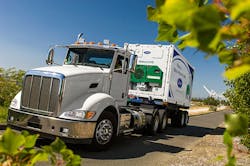Carrier Transicold pursues natural refrigerant technology potential
Carrier Transicold has set its sights on natural refrigerant technology that surpasses current alternatives in terms of reducing environmental impact, voluntarily aligning with the US Environmental Protection Agency’s latest and more stringent refrigerant change listing for other commercial, non-transport refrigeration systems.
Truck and trailer refrigeration units in North America use R-404A, one of a number of hydrofluorcarbon (HFC) refrigerants for which the EPA, through its Significant New Alternatives Policy (SNAP) program announcement, established new restrictions in other applications, such as stationary commercial refrigeration systems.
“We are committed to expanding our proven, environmentally responsible natural refrigerant systems for road transport,” said David Appel, president, Carrier Transicold & Refrigeration Systems. “Specifically, we are building on our expertise with the natural refrigerant carbon dioxide (CO2), which has a significantly lower global warming potential (GWP) than current synthetic refrigerants and their alternates.”
Effective in 2015, the European Union’s new F-Gas regulation (EU517/2014) aggressively ramps down the use of high-GWP HFC refrigerants. As an option to the HFC R-404A for truck and trailer systems in Europe, Carrier Transicold and other transport refrigeration equipment providers now offer the refrigerant R-452A, a three-component blend that includes a hydrofluoroolefin (HFO) and has a GWP about 45% lower than R-404A. However, R-452A is awaiting required SNAP approval by EPA for use in the United States.
R-452A, if approved by EPA, could become an interim option for US truck and trailer customers seeking more environmentally responsible refrigerants.
“Carrier Transicold’s greater goal for transport refrigeration significantly surpasses the benefits of R-452A,” said Appel. “The natural refrigerant CO2 is cost-effective, readily available worldwide, and has a GWP of only 1, which is roughly 2,000 times better than R-452A (GWP 2,140) and 4,000 times better than R-404A (GWP 3,922).”
Carrier has successfully applied CO2 refrigerant in stationary commercial refrigeration and marine transport applications.
Since its introduction in 2004, more than 1,600 supermarkets across Europe have adopted Carrier’s CO2OLtec commercial refrigeration system, which uses CO2 refrigerant. In 2013, Carrier Transicold commercially launched the NaturaLINE unit, the world’s first marine container refrigeration system using CO2 refrigerant, which can lower carbon emissions by 28% compared with previous systems.
To help facilitate greater adoption of CO2 as a refrigerant in the United States, Carrier successfully petitioned the EPA to approve the low-GWP refrigerant for transport refrigeration. The agency now lists CO2 as “acceptable” for new transport refrigeration applications.
To learn more, see www.transicold.carrier.com.
